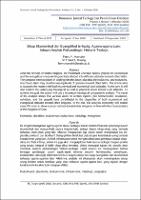| dc.contributor.author | Mamahit, Ferry Yefta | |
| dc.date.accessioned | 2020-10-22T04:12:46Z | |
| dc.date.available | 2020-10-22T04:12:46Z | |
| dc.date.issued | 2020 | |
| dc.identifier.citation | Mamahit, Ferry Y. “Sikap Ekumenikal Dan Evangelikal Terhadap Agama-Agama Lain: Sebuah Analisis Perbandingan Historis-Teologis.” Dunamis 5 no. 1, (2020): 71-92. https://doi.org/10.30648/dun.v5i1.329 | en_US |
| dc.identifier.uri | https://doi.org/10.30648/dun.v5i1.329 | |
| dc.description.abstract | Di tengah kebangkitan agama-agama dunia, berbagai tubuh Kristen Protestan (utamanya kaum ekumenikal dan evangelikal) secara fragmentatis terbagi dalam sikap-sikap yang berbeda terhadap iman-iman yang lain. Mereka mengajukan tiga posisi dalam menghadapi isu ini: pluralis, inklusif, dan eksklusif. Setiap pilihan berakibat pada tingkat keterbukaan yang berbeda kepada iman yang lain. Artikel ini bertujuan untuk mengakrabkan para pembaca kepada sikap-sikap ini. Pada intinya, artikel ini juga akan mengekplorasi baik isu-isu teologis maupun praktis yang secara integral di balik sikap-sikap tersebut. Untuk mencapai tujuan ini, penulis akan memakai analisis perbandingan historis-teologis. Hasil analisis ini menunjukkan bahwa berbagai pandangan dalam aspek-aspek tertentu (seperti hemeneutika, pewahyuan, keselamatan, dan injil) telah berkontribusi kepada disparitas sikap evangelikal dan ekumenikal terhadap agama-agaman lain. Akhirnya, analisis ini diharapkan akan memampukan setiap orang Kristen untuk bersikap yang tepat terhadap agama-agama lain, yang sejalan dengan karakteristik-karakteristik Kerajaan Allah. | en_US |
| dc.description.abstract | Amid the revivals of world religions, the Protestant Christian bodies (mainly the ecumenical and the evangelical ones) are fragmentally divided into different attitudes toward other faiths. They propose three positions in dealing with this issue: pluralist, the inclusivist, and exclusivist. Any choice taken may result in varying levels of openness toward other faiths. The article aims to acquaint the readers with both ecumenical and ecumenical such attitudes. At the core, it will also explore the underlying theological as well as practical issues behind such attitudes. To achieve the goal, the author will use a historical-theological comparative analysis. The result of the analysis shows that various views on certain aspects (like hermeneutics, revelation, salvation, and the gospel) have contributed to the disparities of both ecumenical and evangelical attitudes toward other religions. In the end, this analysis expectedly will enable every Christian to show a proper attitude toward other religions, in-line with the characteristics of the Kingdom of God. | |
| dc.publisher | Dunamis 5 no. 1 | en_US |
| dc.subject | Pluralism -- Religious aspects -- Christianity. | en_US |
| dc.subject | Exclusivism | en_US |
| dc.subject | Inclusivism | en_US |
| dc.subject | Mission | en_US |
| dc.subject | Evangelicals | en_US |
| dc.subject | Ecumenicals | |
| dc.title | Sikap Ekumenikal Dan Evangelikal Terhadap Agama-Agama Lain: Sebuah Analisis Perbandingan Historis-Teologis | en_US |
| dc.type | Article | en_US |


